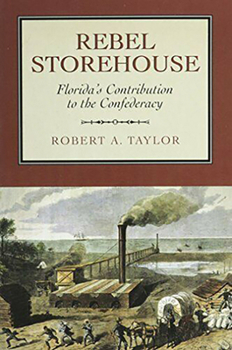Rebel Storehouse: Florida's Contribution to the Confederacy
Select Format
Select Condition 
Book Overview
Brings to light an overlooked aspect of Florida's importance to the Confederacy Florida's role in the Civil War has long been overlooked or discounted by students of the conflict. Despite its isolation and the lack of important land battles, the state made a contribution to the Confederate war effort far out of proportion to its small population. After seceding from the Union in 1861, Florida joined the Confederacy with a reputation,...
Format:Hardcover
Language:English
ISBN:0817307761
ISBN13:9780817307769
Release Date:September 2004
Publisher:University Alabama Press
Length:232 Pages
Weight:1.20 lbs.
Dimensions:0.9" x 6.3" x 9.3"
Customer Reviews
2 ratings
Overlooked No More
Published by Thriftbooks.com User , 14 years ago
While Florida was an early joiner of the Confederacy her importance to the cause is often overlooked or ignored completely. Historian Robert A. Taylor attempts to change this view in his book Rebel Storehouse Florida's Contribution to the Confederacy. Florida's economy during the 1850's was mostly agricultural made up of small to medium sized farms. Most trading was done with Cuba and the Bahamas with some products going to Savannah, GA or Charleston, SC. The election of 1860 was a turning point in Florida history and the state gave it's electoral votes to John Breckinridge. With the election of Abraham Lincoln Florida quickly withdrew from the Union and joined the seceeded and soon to seceed states. While little action took place comparitively in the state Taylor argues Florida played a vital role in the Confederacy lasting as long as it did. Florida played a vital role in providing armies with food amd much need salt. Saltworks were set up in many locations along the coasts where sea water could easily be gathered and boiled. These became prime targets for Union warships acting as a blockade. Floridians however were resiliant and as quickly as Union troops would destroy a saltworks they would be rebuilt. Agriculture was vital importance as crops in more northern Confederate states were destroyed by war or Union troops. Without food the armies of the Confederacy would grind to a halt. In order to encourage food crops limits were placed on crops such as cotton and tobacco. Corn and grains were needed to help feed locals and troops in the field. Citrus crops such as oranges, lemons, and limes helped to reduce disease by providing much needed vitamins. Sugar and molasses were also shipped north to the front lines. Meat was much needed by the troops and Florida provided fish, pork and beef. Cattle ranching was a profitable venture as beef was need by all the Confederate troops and was also needed to help feed the growing prisoner populations. Cattle were also prized for the leather they would provide for shoes. Not all was rosy however in the state. Support for the Confederacy was by no means unanimous and many resented the demands being placed upon them by the new government. Food supplies were short in the state and sending the limited resources north caused residents to go without. Confederate currency was not trusted by many who preferred a backed currency or hard assets such as gold. Many Floridians also resented the mandatory selling of goods to the government at set prices. This came about through the Impressment Act of 1863. This was put in place as a means to help support the government and also to prevent speculation and rising prices. The Impressment Act became so unpopular it was taken to state court where the Florida Supreme Court ruled in Yulee v. Canova that state courts could limit the rights of government supply officers within state borders. Unrealistic demands continued to be placed upon the state by armies who had no idea o
Outstanding overview for Florida history enthusiasts and Civil War buffs alike
Published by Thriftbooks.com User , 14 years ago
Taylor's "Rebel Storehouse" is a comprehensive overview of Florida's involvement during the American Civil War. From the engagements around the state, the Union presence in St. Augustine and Ft. Meyers, and Florida's production of salt, molasses, and the transportation of cattle, Taylor has managed to bring it all together in this concsice book. Though his writing is a little off at times, the information contained in the book itself is valuable for all interested in Florida's participation in the war. After reading this, many may find that Florida played a much larger role in the Confederacy that one expected.





